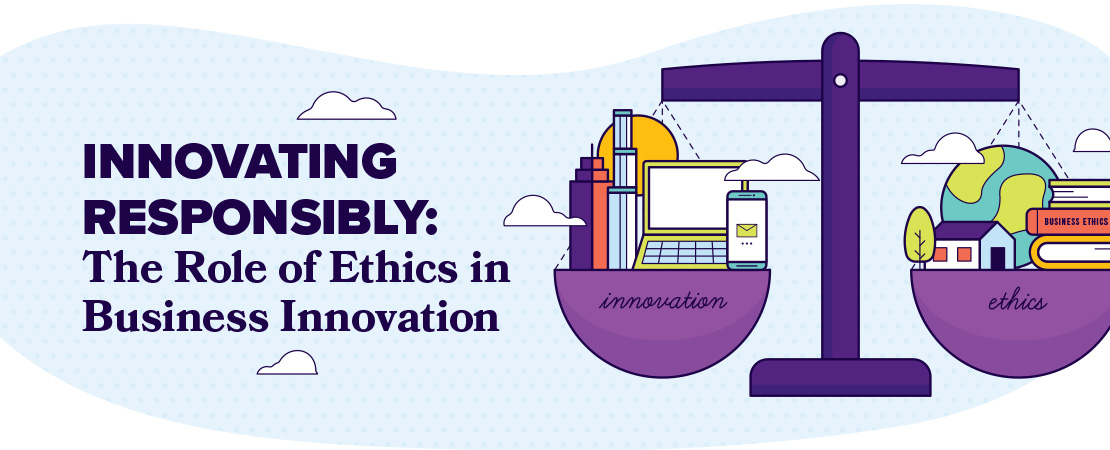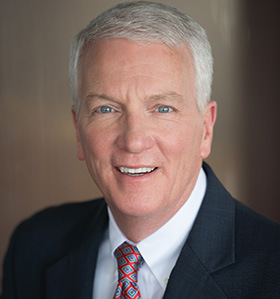Innovating Responsibly: The Role of Ethics in Business Innovation
Innovating Responsibly: The Role of Ethics in Business Innovation

Innovation is happening at a never-before-seen pace. While there’s a rush toward something new and exciting, the role of ethics in the decision-making process can take a back seat and be undervalued, leaving businesses open to risk.
Just think of the last time you’ve heard of a business in the news or going viral on social media for an unethical practice. It likely wasn’t long ago. Information can spread like wildfire, and unethical behavior can tarnish a company’s reputation within minutes. According to a recent Accenture study, more than 60% of customers say their purchasing decisions are driven by a company’s ethical values and authenticity.
Robert Earle, professor of philosophy and David W. Wilson Ethics Fellow, believes ethics and innovation must be inseparable.
Businesses have a wide range of ethical factors to consider when undergoing innovation. “Stakeholders” is a broad term, but it includes customers, employees, people who live near production centers, or even non-human things, like the environment or a country. In his teaching, Earle encourages students to think through what responsibility companies have to those stakeholders and society at large, simulating the thought process innovators and business leaders need to go through when creating a new product or service.

“You can get caught up in doing something new and there’s so much potential, and you can veer on the side of optimism about the positive outcomes,” Earle said. “But ethical assets take time, to look at the affected stakeholders and potential negative outcomes, to bring people into the discussion.”
Ethics needs to be built into the culture of the company for the company to be effective in practice. Kelly Noll, (Management, ‘78), former Chief Ethics, Compliance & Privacy Officer for Allstate Insurance, said he was ultimately in charge of the ethical conduct of the organization. Allstate had an umbrella of behaviors and values all employees, regardless of roles or location, were expected to abide by. Of course, there were more values to consider depending on employee roles and the country’s customs and laws.
“You’ve got to make sure that people are thoughtful about innovation,” Noll said. “You don’t want ethics to get in the way, but you have to make sure it’s part of the conversation as products and services are being innovated and people are doing things differently than what they used to do before.”
During Noll’s tenure at Allstate, leaders would pull together a group of employees who understood, or would be affected by, the innovation when new products or services were being developed. The goal was to discuss potential unintended consequences, and the compliance team played a heavy role because of the strong regulation around the insurance industry.
“It was a forum where you could brainstorm and bring up issues and concerns,” Noll said. “The last thing you want is to roll out something new and find out it violates a regulation or practice. The idea was you didn’t want to necessarily get in someone’s way, but you wanted to make sure they had information to consider as they build products and services.”

When Allstate moved toward streamlining its claims technology through a mobile app and centralized claim centers, the company realized it didn’t need as many physical claims locations as it had in the past. Leadership worked with claims’ employees and remained transparent about their decision-making process about whether to move people into different roles or offer generous severance packages.
“Ethics really played a huge role while we were developing technology, rolling it out and when it affected our employees,” Noll said. “We wanted to treat our people like we were treating our customers.”
Oftentimes, there’s no one right path to take. Earle described there can be multiple right ways to reach multiple correct answers. Ethics can be murky. But conversations about ethics, doing right by stakeholders and making it a priority to be as ethical as possible are important steps in doing the right thing while innovating as a business.
“The mindsets and virtues we develop in the process are equally important to the ultimate decisions we make,” Earle said.




